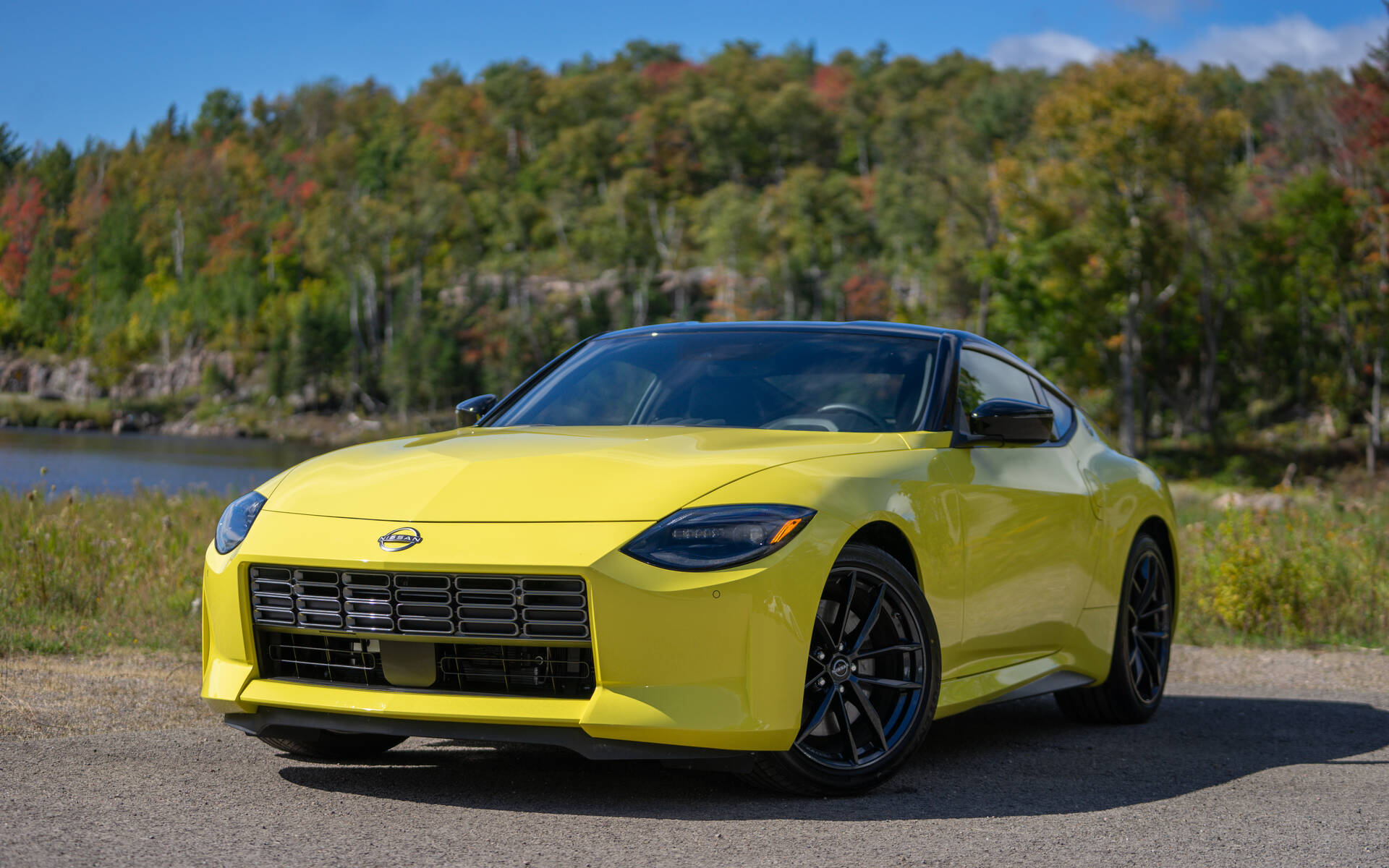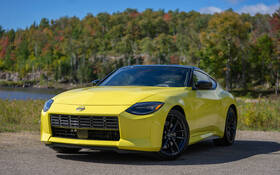2023 Nissan Z: Secrets From the Road and the Track

| Strong points |
|
|---|---|
| Weak points |
|
The all-new 2023 Nissan Z is finally arriving in Canada—admittedly a bit late for a sports car that will mostly be used in the summer. But since the first snowflakes are still a few weeks, Nissan Canada invited The Car Guide to a road and track test in the Laurentides region of Quebec, home of Circuit Mont-Tremblant.
The successor to the old but pleasant 370Z is not a major evolution from a technical standpoint, but the changes it brings to the table are more than welcome.
- Also: 2023 Nissan Z : Like Reconnecting With An Old Friend
- Also: The New 2023 Nissan Ariya and Nissan Z Uncovered at Nissan Studio in Toronto
At the top of the list is a retro-inspired design update that features some cues from past Z models. The silhouette is highly reminiscent of the original. Ditto for the sloping front end and Y-shaped sculpting on the hood. The headlights are an obvious nod to the 240Z, yet perform like real modern units should.

In the rear, the inspiration comes directly from the 300 ZX, especially the rectangular shape of the taillights which has been given a 21st-century twist.
The similarities continue inside, this time with three analogue gauges at the top of the dashboard like in the 370Z. However, there are now two digital displays—one in the middle and another in front of the driver—in keeping with the latest car interior trends. The steering wheel, centre console and seats are all redesigned, the latter featuring more pronounced side bolsters.

Pricing ranges from $46,498-$65,748, which is more expensive than the 370Z, obviously, but right where it needs to be by today’s standards. By the way, a limited-edition Proto Spec model is available, sporting a unique yellow body, yellow stitching, two-tone seats and a serialized plaque. Nissan is not saying how many units it will make, mind you.
Once Naturally Aspirated, Now Twin-Turbocharged
As mentioned earlier, the new Z is not a radical departure from its predecessor, but there’s one significant change under the hood. The naturally aspirated 3.7-litre V6 is replaced by the same twin-turbocharged 3.0-litre V6 found in the sportier Infiniti Q50 and Q60 models. It produces 400 horsepower (+68) and 350 pound-feet of torque (+80).
In order to reduce turbo lag, Nissan engineers positioned the turbos as close to the engine as possible and incorporated a turbo speed management system for more responsive acceleration. Intake air temperature is optimized as part of an improved cooling system. Meanwhile, a standard six-speed manual transmission or optional nine-speed autobox handles power delivery to the rear wheels.

On the Road
We left Pierre-Eliott Trudeau Airport in Montreal and headed toward the countryside via a nearby highway. The first thing we noticed was how noisy the car can get. As soon as you go faster than 90 km/h, road noise and wind noise fill the cabin—even more so on rough pavement. Considering how poorly maintained some of our roads are in Canada, it could be a deal breaker if you plan to spend a lot of time on freeways.
We then hit some twisty roads—arguably the new Z’s favourite playground—and once again the car felt like the 370Z in many ways. Handling is sharp, steering is nicely calibrated, and the powerful brakes are easy to modulate. Sure, the firm suspension can punish you when driving over large cracks and bumps, but overall ride quality is fairly good by sports car standards. The Z is quite fun to push and toss around, though the front wheels have a knack for finding road imperfections, so you need to make steering adjustments more frequently than with some other cars.

In order to preserve a decent level of comfort, Nissan gave the suspension a good amount of travel, inevitably resulting in body roll when attacking sharper turns. Most drivers who use their Z as a sporty tourer probably won’t mind, however, and actually might prefer this setup.
Obviously, the new engine is a real treat. Blessed with a lot more torque than the 370Z ever offered, the car takes off in quick, effortless fashion. Similar to the Infiniti Q50 Red Sport, peak performance is achieved from 5,000-7,000 rpm. This sort of high-revving action is admittedly more appropriate with a sports coupe like the Nissan Z than a compact luxury sedan like the Q50. In fact, we regularly pushed the tach needle near the 7,000 rpm mark.

On manual models, the clutch could definitely be more progressive and easier to modulate, though, especially when shifting through the first three gears. Also, we’d prefer the shifter to have shorter throws. Meanwhile, the automatic transmission does a proper job in daily driving conditions, but it’s not as quick as a dual-clutch unit.
On the Track
Having a venue like Circuit Mont-Tremblant to test a car like the Nissan Z was fantastic. Sadly, Mother Nature refused to cooperate. But it wasn’t just the rain making the track pretty slippery: the cars that took part in the Fall Classic a day prior left plenty of rubber in their wake.
While we couldn’t properly assess the Z’s grip, we did notice that the engine’s torque overwhelmed the rear axle even with a slight pressure on the throttle. It was even worse with the manual gearbox. Revving the engine up too much also caused the wheels to spin and sent the car fishtailing.

What about that body roll we experienced on our way to Mont-Tremblant? Again, due to the slippery track, we couldn’t push the car fast enough to find the answer we were looking for.
Our Verdict
At the end of the day, we can still confidently say that the new, seventh-generation 2023 Nissan Z is a dynamic performer and an improvement over the 370Z. With 1.8 million units sold over 53 years, the automaker has a winning recipe and understandably didn’t want to change it too much, even though some fans were hoping for more.











